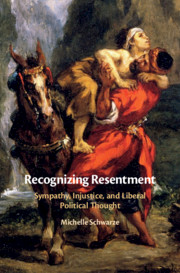4 - Coping with Resentment
Spectatorial Resentment and Spontaneous Disorder in Smith
Published online by Cambridge University Press: 02 October 2020
Summary
Like his predecessors, Adam Smith saw the value of resentment as a motive for justice and an emotion that best captured our belief in the equality of others, but he offered the most comprehensive account of how the passion of resentment might be made into a moral (or proper) passion. Through his innovative impartial spectator theory, which explains how–and why–individuals refine their own emotions and learn to better recognize the emotions of many, varied others, Smith developed a theory of justice based on spectatorial resentment that avoided the pitfalls of partiality and while leveraging resentment's potency as a motive and intimate connection to injustice. More than any other thinker, Smith was also attuned to the psychological toll that the refinement of spectatorial resentment imposed on victims and spectators of injustice alike, however, casting his social and political theory in a somewhat tragic light. Smith thus offers a therapeutic view of religious belief as one means available to liberal citizens who must cope with lingering resentment in an unjust world.
- Type
- Chapter
- Information
- Recognizing Resentment , pp. 98 - 128Publisher: Cambridge University PressPrint publication year: 2020
- 1
- Cited by

